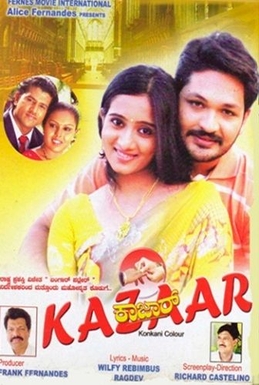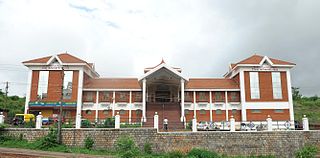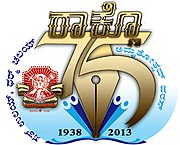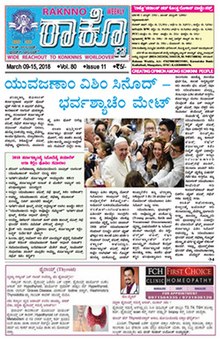
Konkani is an Indo-Aryan language spoken by the Konkani people, primarily in the Konkan region, along the western coast of India. It is one of the 22 scheduled languages mentioned in the Indian Constitution, and the official language of the Indian state of Goa. It is also spoken in Karnataka, Maharashtra, Kerala, Gujarat as well as Damaon, Diu & Silvassa.

Mangalorean Catholics are an ethno-religious community of Latin Christians from the Diocese of Mangalore and the erstwhile South Canara area, by the southwestern coast of present-day Karnataka, India.
Shenoy is a surname from coastal Karnataka and Goa in India. It is found among Hindus of the Goud Saraswat Brahmin community following Smartha Sampradaya of Kavale Matha or Madhva Sampradaya of either Gokarna Matha or Kashi Matha.
Daijiworld Media is an Indian company, headquartered in Mangalore, that provides news services, including the web portal, www.daijiworld.com. It was founded by Walter Nandalike, as www.daijidubai.com on 14 January 2001, primarily with the objective of relaying news from the Coastal Konkan region of India. It was later renamed as www.daijiworld.com, and established as a media company in 2007.
The culture of Mangalorean Catholics has been shaped by their Christianisation in Goa, their migrations& their captivity. They adopted elements of the local Mangalorean culture, but retained many of their Konkani customs and values. The ethnic Mangalorean houses of the older generation have spacious porticos, red oxide cemented floors, terra cotta roofs layered with the once famous Mangalore tiles. The houses are usually accompanied by their own private wells or ponds, and are normally attached to orchards of coconut trees, jackfruit trees, ice apple trees, Alphonso mango trees, areca nut trees etc.
Mangalorean Catholic literature is diverse.
Mangaloreans are a collection of diverse ethnic groups that hail from the historical locales of South Canara (Tulunaad) on the south western coast of Karnataka, India, particularly the residents native to Mangaluru.

Tulu Nadu State movement is aimed at increasing Tulu Nadu's influence and political power through the formation of separate Tulu Nadu state from Karnataka and Kerala. Tulu Nadu is a region on the south-western coast of India. It consists of the Dakshina Kannada and Udupi districts of Karnataka and Kasargod district up to the Chandragiri river in Kerala. The Chandragiri River has traditionally been considered a boundary between Tulu Nadu and Kerala from the fourth century AD onwards. The first call for a separate Tulu Nadu state was made just after the Quit India Movement in 1942 by Srinivas Updhyaya Paniyadi, a banker and a press owner from Udupi. Mangalore is the largest and the chief city of Tulu Nadu. Tulu activists have been demanding a separate Tulu Nadu state since the late 2000s, considering language and culture as the basis for their demand.
Vincent John Peter Saldanha was an Indian Konkani language littérateur, dramatist, novelist, short-story writer and poet. He made significant contributions to Konkani literature as a poet, dramatist, novelist, and a litterateur.
Pius Fidelis Pinto is an Indian priest and research scholar of Christianity in Canara, India. He is noted for his research work and publications on the history of Konkani Christians of Dakshina Kannada then erstwhile South Canara. He has written eight books and presented 36 research papers at various events across the world.
Karnataka is a state in the southern part of India. It was created on 1 November 1956, with the passing of the States Reorganisation Act. Karnataka is bordered by the Arabian Sea to the west, Goa to the north-west, Maharashtra to the north, Telangana and Andhra Pradesh to the east, Tamil Nadu to the south-east, and Kerala to the south-west. The state covers an area of 74,122 sq mi (191,976 km2), or 5.83% of the total geographical area of India. It comprises 30 districts. Kannada is the official language of Karnataka and as per the 2011 census is the mother tongue of 66.5% of the population. Various ethnic groups with origins in other parts of India have unique customs and use languages at home other than Kannada, adding to the cultural diversity of the state. Significant linguistic minorities in the state in 2011 included speakers of Urdu (10.8%), Telugu (5.8%), Tamil (3.5%), Marathi (3.4%), Hindi (3.2%), Tulu (2.6%), Konkani (1.3%) and Malayalam (1.3%).

Basti Vaman Madhav Shenoy was an Indian Konkani activist, popularly known as "Vishwa Konkani Sardar" and was the founder of World Konkani Centre in Shakthinagar, Mangalore.

Kazaar is a 2009 Konkani film directed by Richard Castelino and produced by Frank Fernandes. It stars Larry Fernandes and Harshika Poonachcha. Larry stars in the movie as a NRI boy, who comes back to Mangalore to get married, while Harshika plays the role of his bride. The movie was initially scheduled to be released on 9 September 2009 but was delayed by two months, finally being released on 27 November 2009.

World Konkani Centre was founded by Konkani Bhas Ani Sanskriti Prathistan at Konkani Gaon, Shakti Nagar, Mangalore, to serve as a nodal agency for the preservation and overall development of Konkani language, art and culture involving all the Konkani people the world over.
John Baptist Moraes was a Konkani poet and writer. He was based in Bombay (Mumbai), which he migrated to in 1951 and wrote in Konkani in the Kannada script. He was also the founder and co-editor of the Konkani Daiz monthly, he was on the editorial board of the Poinnari weekly, and in 2002 was appointed member of the General Council of the Sahitya Akademi, India's academy of letters.

Canarese Konkani are a set of dialects spoken by minority Konkani people of the Canara sub-region of Karnataka, and also in Kassergode of Kerala that was part of South Canara.
The Konkani language agitations were a series of protests in India, concerning the uncertain future of the Konkani language. They were held by Goans in the former territory of Goa, Daman and Diu; then under the administration of the Maharashtrawadi Gomantak Party (MGP). The protests involved citizen journalism, student activism & political demonstrations. The civil unrest ceased when premier official status for Konkani in the Devnagari script was granted. Marathi was declared an associate official language of Goa.
The history of Bible translations into the Konkani language begins with Ignazio Arcamone (1615–1683), an Italian Jesuit working in Salcette, Goa was the first to translate parts of the Bible to Konkani language. It was published under the title "Sogllea Vorunsache Vanjel" from Rachol Seminary Printing Press in 1667. Copies of this book are not available.

Konkani literature is literature in the Konkani language, mostly produced in three scripts: Roman, Devanagari and Kannada. Konkani literature is eligible for the Sahitya Akademi Award.
Mandarke Madhav Pai was an Indian Kannada, Sanskrit and Konkani linguist.









